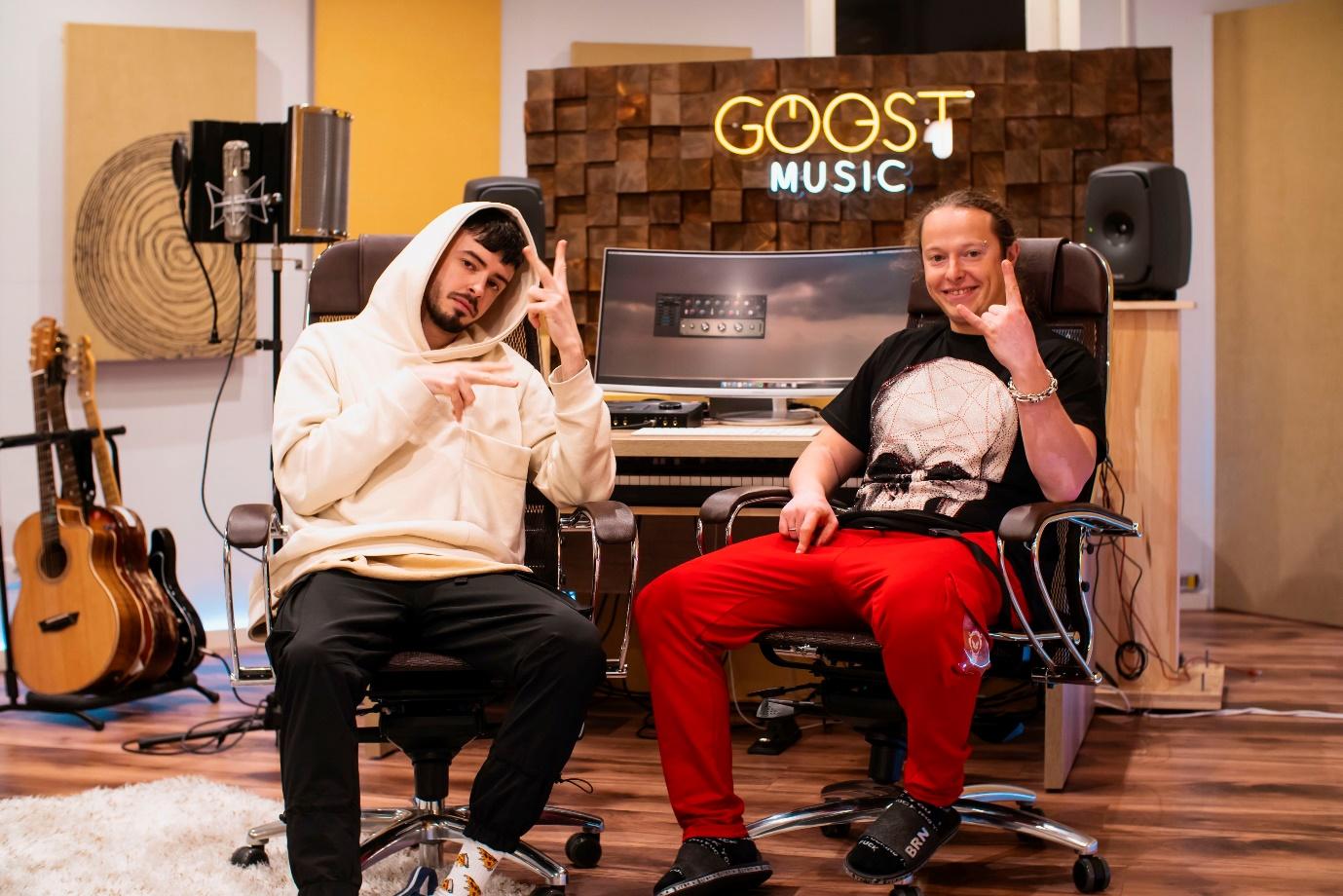
Many of us have heard about phonk, a popular subgenre of electronic music. In its original form, the style appeared in the south of the USA in the 1990s as a spinoff of hip-hop and trap music, always with a touch of dark atmosphere.
The second wave of popularity of this musical style has taken over TikTok since the middle of 2020. The modern sound of phonk is different from original old school sound and includes two most popular subgenres, aggressive drift phonk and atmospheric chill phonk.
Goost Music is one of the labels whose vector of development is focused on support and signing of artists from Eastern Europe. Most phonk producers come from this region. The label's catalog includes such names as OBLXKQ, FindMyName, Nikitata, DVRST, RXLZQ, Øneheart; the numbers of Spotify listens reach hundreds of millions, and the age of artists is under 21 years. This can truly become an important part of the future musical market.
Our partners in conversation today are: Musical Producer and Director of Goost Music Dmitry Mikulich and General Producer and Lead Label Musician Vladimir (Vo) Razvodovsky.
Hi guys, how have you been? So, tell us, how did you meet and what was the moment that made you realise you wanted to start a label?
Dmitry: Hi! Well, the story started when I invited Vova as a musician into one of my bands that I was producing and recording before starting the label. Vova is an amazing musician who have played with many well-known bands, and we realized straight away that we could do something cool together.
Vo: The idea of a label came to us in 2020 upon meeting an IT businessman from London, who was very interested in musical business and offered us his financial and legal support if Dima and I would come up with an idea for such a business. We realized that our experience in music, sound recording and production, wrapped in a refined business scheme, could yield great results. This is how Goost Music came to be.
But you started as musical producers and songwriters, releasing pop songs at your label, didn't you?
Vo: We still release a lot of material by singing artists, but the focus has indeed shifted a lot to the international market due to the unprecedented growth in popularity of electronic musicians from Russia, Ukraine, Belarus, Baltic Countries and ex-Soviet Central Asia. Our head office is in Minsk, from where it is it very convenient to work with local artists: we are close in terms of mentality, understand all the legal and tax system of these countries well and can invite an artist to join us.
Dmitry: Our first and biggest electronic artist was OBLXKQ in late 2021, who had over 30 tracks in a little more than a year and managed to achieve his own trademark sound. We are huge fans of his music and really want him to achieve international fame. It was at that moment when we realized that we could work in a new but extremely interesting and promising direction.
Vo: In terms of songs, we continue to work with an extremely interesting project called Nikitata, where we have mixed hardcore electronic phonk with the artist's pop vocals. The artist is very popular in Russian-speaking countries, but we see his audience in the USA grow. The language has shifted to the background, and music that is truly great can be now heard across the world. We are currently preparing several Nikitata's collaborations with American artists.
What do you look for when signing new artists?
Dmitry: Music is the most important thing. If we hear promise in the music, we sign the artist without thinking. And yes, we have a big enough team to listen to all the material sent to our e-mail and respond to everyone.
Vo: But if music is also supported by the willingness to develop social media, TikTok first of all, it can be a bonus. In this case we are ready to offer more extensive support to the artist.
Vo, you are an experienced multi-instrumentalist, while Dmitry is one of the best sound producers in Belarus. How does it help you in creative process between you and artists?
Vo: When an artist reaches a certain level, he or she really needs support and cooperation with a team in order for the project to strengthen its positions. We cooperate in drawing up content plans, organize photo and video sessions for promotion, and work with the artist's catalog for further marketing and licensing.
In addition to this, however, most of the time we work in the studio or remotely on musical arrangements, the sound of our releases and the creation of musical ideas for new hits. Correct approach to these components is impossible without a good knowledge of musical instruments and arrangement, and my background and musical support of the tracks are extremely handy here.
Dmitry: My task within the label is also to help artists with the sound, mixing and mastering of releases. Most of the time, electronic tracks must meet the international standards and sound in Spotify playlists as good as world-famous hits. Sound work is a rare service to be provided by a label, but we pay a lot of attention to it.
What is the driver behind the popularity of electronic music from Eastern Europe in recent years?
Vo: I attribute it to several factors. Firstly, children of the digital age, who have been working with computers since early childhood, are now coming of age. In order to create a track, you only need to know how to use a single musical sequencer program (like Fruity Loops). Therefore, many kids, even as young as 13 years old, begin to create and publish their tracks. Secondly, electronic music from our countries is extremely authentic, often somber and dark, but with a very atmospheric sound. If you have ever seen grey micro-districts of post-Soviet cities, you know where it all comes from.
Dmitry: Local creative groups including musicians, digital artists and video editors are also a force to be reckoned with. One of them is CRESTA LA CULTURA, where the artists gain hundreds of millions of listens and enjoy great popularity across the world. A compilation of artists from this community was released last year at our label, and it is a wonderful example of the cultural layer of modern electronic music.
Vo: It is important to add that such popularity of phonk as a style originates from its virality in TikTok and creation of an editorial playlist in Spotify. We believe that these two platforms are the most progressive today and serve as a key to music promotion.
But we're not going to stop at phonk music: another one of our goals today is to expand the roster of genres.
Are there any plans to organize live performances for phonk artists?
Dmitry: We study this matter constantly and conduct analytical work with our partners involved in concert activities. We hope to see the names of our artists on the posters of festivals and clubs across the world. Vladimir is also one of the musicians planning to be actively involved in this direction and perform on stage.
What prospects do you see for modern development of phonk? Will it grow into something bigger or remain only a temporary trend?
Dmitry: It is very interesting for us to see unexpected electronic subgenres stem from phonk. Artists are experimenting with the sound, with a mix of different styles more and more, beginning to develop with a wider range of genres. For example, phonk house, wave phonk or future garage are currently becoming as relevant as trendy and aggressive drift phonk.
Vo: In any case, the time will tell, but we can currently feel the great potential of young artists from Eastern Europe. It is not the easiest of times for the region from the geopolitical point of view, but the culture flourishes in periods like this one; the artists are full of emotion, and they truly have something to say.
As a musician and a musical producer who have launched the most successful label in Belarus, was is your advice to beginner artists?
Dmitry: The advice is simple: you need to understand that it is usually a lot between the start of your work and your success. If you are ready for a long and hard way, then don't stop.
Vo: Listen to more of other music, learn to play musical instruments, search for images in books, cinema and architecture. And don't forget that finding your team in time is the most important thing in becoming a big artist.
* This is a contributed article and this content does not necessarily represent the views of musictimes.com













